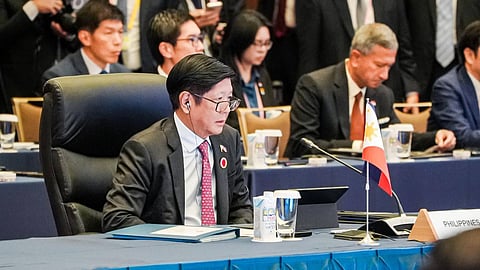
- NEWS
- the EDIT
- COMMENTARY
- BUSINESS
- LIFE
- SHOW
- ACTION
- GLOBAL GOALS
- SNAPS
- DYARYO TIRADA
- MORE

President Ferdinand Marcos Jr. said that the Philippines will keep working for peace even though tensions are rising in the West Philippine Sea.
In an interview with Japanese media in Tokyo late Saturday night, Marcos said that aggression has not stopped in the disputed waters.
Marcos added that China's growing assertiveness presents a serious threat to its Asian neighbors.
"I'm afraid we'll have to be able to say that tensions have increased rather than diminished for the past months or the past years and that's why we have to — but we continue to counsel peace and continue communication between the different countries—everyone that is involved," Marcos said.
"The South China Sea situation is the most complex geopolitical challenge that the world faces," Marcos added.
Hence, he wanted to forge strong alliances with like-minded allies since no country in the world wanted to start a new conflict, particularly in Asia.
Marcos also mentioned that the Philippines is open to new ideas that will be needed to address the current challenges in geopolitics.
"I cannot say that we have found the answer yet. We are still trying to formulate that answer as we speak. And things are moving very quickly in many parts of the China Sea and so there are changes in terms of approaches, [the aggravations]," he said
Marcos pointed out that the growing cooperation between Japan and the Philippines is a "very good example of evolution."
Negotiations between the Philippines and Japan have begun on a reciprocal access agreement that would permit the stationing of military soldiers on each other's territory.
However, the Chief Executive acknowledged that the Philippines needs additional bilateral and international agreements of this nature.
"It is not sufficient actually with just Japan and the Philippines to enter into this agreement. We really must get more of these kinds of arrangements in place," Marcos said, referring to the trilateral agreement between the United States, Japan, and the Philippines.
Tensions over claims in the disputed waters started anew a week ago when Manila and Beijing swapped accusations after a collision of their vessels close to a disputed shoal in the South China Sea.
Together with the Philippines, other Southeast Asian countries Vietnam, Indonesia, Malaysia, and Brunei also assert territorial claims to portions of the South China Sea, which China disputes and which accounts for nearly all of the world's ship traffic, worth over $3 trillion annually.
Beijing disagrees with the Permanent Court of Arbitration's 2016 finding that China's claims lacked legal validity, which the US supports.
